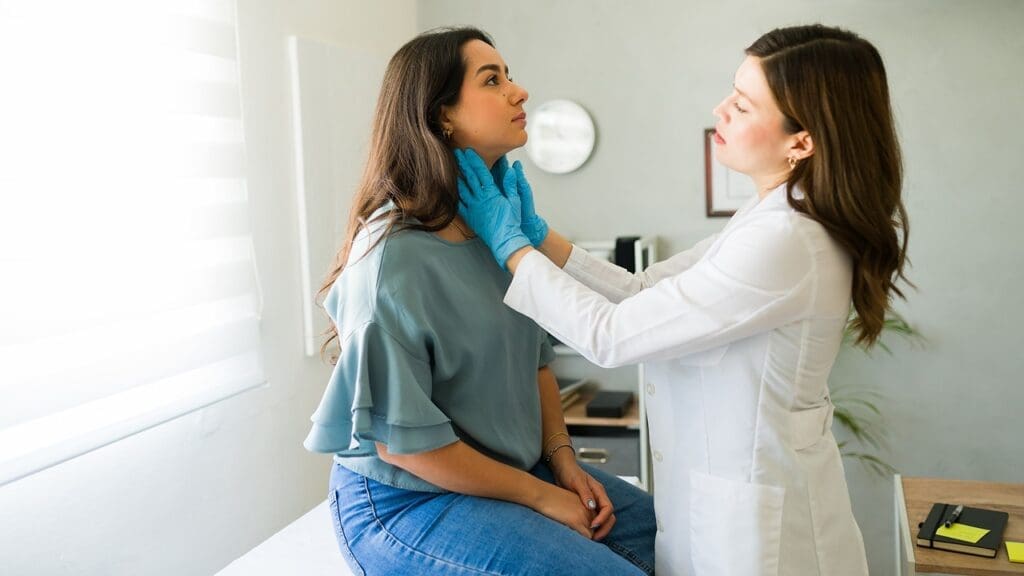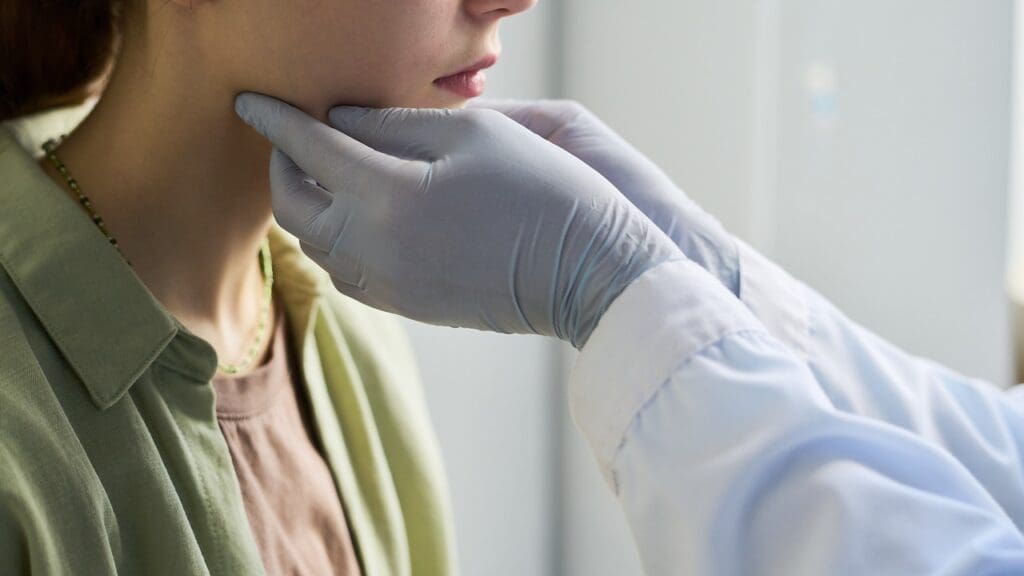Can a Person Live Without a Thyroid and Stay Healthy
The thyroid gland is one of the body’s most important organs, responsible for producing hormones that regulate metabolism, body temperature, and overall energy levels. Located in the neck, it releases hormones known as thyroxine and triiodothyronine that influence nearly every cell in the body. Because of its central role in metabolism and growth, many people wonder, can a person live without a thyroid
The short answer is yes, it is possible to live without a thyroid. However, it requires lifelong hormone replacement therapy and regular medical monitoring to maintain balance in the body. Patients who have had their thyroid removed can live healthy, active lives as long as they receive appropriate treatment and follow medical guidance. Liv Hospital offers advanced endocrine care and personalized treatment plans to help patients adapt to life after thyroid removal safely and comfortably.

Understanding the Role of the Thyroid Gland
The thyroid gland regulates how fast the body uses energy, how warm it stays, and how efficiently organs function. It controls metabolism, which affects everything from heart rate to digestion. The thyroid also helps regulate body weight, mood, and muscle strength.
When the thyroid becomes underactive or overactive, it can lead to conditions such as hypothyroidism or hyperthyroidism. In some cases, surgery to remove the thyroid gland becomes necessary due to nodules, cancer, or severe autoimmune disorders. Understanding the essential functions of this gland helps patients appreciate why proper management is vital when it is no longer present.
Reasons for Thyroid Removal
Thyroid removal, or thyroidectomy, may be required for several medical reasons.
Thyroid Cancer
Thyroid cancer is one of the most common reasons for complete thyroid removal. The surgery ensures that all cancerous tissue is eliminated to prevent recurrence or spread.
Goiter and Enlargement
Large goiters can cause breathing or swallowing difficulties by pressing on the trachea. Removing the gland helps relieve these symptoms and improves quality of life.
Overactive Thyroid
In cases where medication or radioactive iodine therapy cannot control hyperthyroidism, thyroidectomy may be the safest solution.
Nodules and Cysts
Suspicious or symptomatic nodules are often surgically removed, especially if there is a risk of malignancy.
At Liv Hospital, surgeons use advanced imaging and minimally invasive techniques to ensure accurate removal while protecting surrounding tissues and nerves.
What Happens After Thyroid Removal
After thyroidectomy, the body no longer produces thyroid hormones naturally. Since these hormones are crucial for metabolism, they must be replaced synthetically. Doctors prescribe levothyroxine, a medication that mimics the natural hormone thyroxine. The dosage is adjusted based on blood test results and individual needs.
Patients typically start hormone replacement therapy shortly after surgery. Regular follow-ups ensure the correct dosage and prevent symptoms of hormone imbalance. The goal is to restore normal hormone levels so that the body functions as if the thyroid were still present. Liv Hospital’s endocrinologists monitor patients closely to ensure a smooth transition after surgery.
Life Without a Thyroid
Living without a thyroid requires attention but is entirely manageable. Once the appropriate medication and dosage are established, most people can lead normal lives. Energy levels, mood, and metabolism gradually stabilize as hormone therapy takes effect.
Some individuals experience temporary changes in weight or fatigue while their body adjusts. However, consistent medical supervision minimizes these effects. Maintaining a balanced diet, regular exercise, and good sleep supports hormone therapy effectiveness.
Patients under Liv Hospital’s care receive nutritional counseling and long-term monitoring to ensure stability and well-being.
Can a Person Live Without a Thyroid and Stay Healthy
Yes, a person can live a long and healthy life without a thyroid as long as they continue hormone replacement therapy and routine medical care. The key is consistency. Missing medication or taking incorrect doses can lead to symptoms such as fatigue, depression, or weight changes.
Modern endocrinology has made significant progress in managing post-thyroidectomy patients. Synthetic thyroid hormone provides precise control and is well tolerated by most individuals. Liv Hospital uses advanced testing to ensure each patient receives the optimal hormone balance for their body.

Hormone Replacement Therapy and Monitoring
Hormone replacement therapy replaces the hormones that the thyroid no longer produces. The process requires patience during the initial adjustment period. Blood tests are used to measure thyroid stimulating hormone (TSH) levels, ensuring that the dose remains within the target range.
Regular checkups every few months are necessary, especially in the first year after surgery. Once stability is achieved, annual visits are usually sufficient. At Liv Hospital, endocrinologists use advanced diagnostic systems to personalize each patient’s therapy and minimize side effects.
Possible Symptoms After Thyroid Removal
Even with treatment, some patients may experience temporary symptoms while their hormone levels adjust. Common effects include fatigue, sensitivity to cold, mood swings, dry skin, and mild weight gain.
These symptoms usually improve once medication stabilizes hormone levels. In rare cases, calcium imbalances can occur if the parathyroid glands are affected during surgery. Liv Hospital’s surgical teams are trained to minimize such risks and provide immediate correction when needed.
Diet and Lifestyle After Thyroid Removal
A healthy lifestyle supports the body’s adaptation after thyroidectomy. Balanced nutrition with adequate protein, vegetables, fruits, and whole grains helps maintain energy levels. Foods rich in iodine, selenium, and zinc support hormone function, though supplements should only be taken under medical supervision.
Physical activity improves mood and metabolism. Patients are encouraged to engage in moderate exercise, such as walking or swimming. Sufficient sleep, hydration, and stress management also enhance recovery. Liv Hospital offers personalized nutrition and wellness programs for patients who have undergone thyroid surgery to ensure optimal post-operative outcomes.

Emotional and Psychological Adaptation
Adjusting to life without a thyroid is not only physical but also emotional. Some patients worry about dependency on medication or fear that they will not feel like themselves again. Education and professional guidance help overcome these concerns.
Liv Hospital provides psychological support alongside medical treatment to ensure that patients feel confident and informed throughout their recovery. Support groups and counseling sessions encourage positive adaptation and long-term motivation to maintain therapy.
Long-Term Outlook
The long-term outlook for people living without a thyroid is excellent. With regular medication and monitoring, patients can expect a full, active life. Hormone therapy effectively replaces natural thyroid function, and modern healthcare ensures accurate management of hormone levels.
Complications are rare when treatment is consistent. Routine checkups help detect any issues early, and medication adjustments are straightforward. Liv Hospital continues to follow patients through every stage of recovery, ensuring lifelong health and comfort.
Living Comfortably Without a Thyroid
Living without a thyroid is completely possible with proper medical care and lifestyle balance. Patients who take hormone replacement therapy regularly can maintain normal energy, metabolism, and well-being. Liv Hospital ensures personalized follow-up, accurate dosage adjustment, and long-term support for people adapting to life without a thyroid gland.
Conclusion
So, can a person live without a thyroid The answer is absolutely yes. With proper medical management, hormone therapy, and a healthy lifestyle, people without a thyroid can live just as well as anyone else. The thyroid’s functions are replaceable with modern medication, and regular follow-ups guarantee continued balance.
Liv Hospital provides comprehensive endocrine and surgical care for thyroid patients, from diagnosis to post-operative recovery. By combining medical expertise with advanced technology, the hospital helps patients maintain normal hormone levels and enjoy a fulfilling, active life.
Living without a thyroid requires awareness and responsibility, but it does not limit one’s ability to live a healthy, energetic, and happy life. With the right guidance and support, patients can thrive physically and emotionally for years to come.
* Liv Hospital Editorial Board has contributed to the publication of this content .
* Contents of this page is for informational purposes only. Please consult your doctor for diagnosis and treatment. The content of this page does not include information on medicinal health care at Liv Hospital .
For more information about our academic and training initiatives, visit Liv Hospital Academy
Frequently Asked Questions
Can a person live without a thyroid?
Yes, it is possible to live a healthy life without a thyroid through hormone replacement therapy.
What happens when the thyroid is removed?
The body stops producing thyroid hormones, so synthetic hormones must be taken daily.
Is thyroid removal permanent?
Yes, once the thyroid is removed, it cannot regrow or function again.
How long does it take to recover after thyroid removal?
Recovery usually takes a few weeks, but hormone adjustment may take a few months.
Do I have to take medicine for life?
Yes, thyroid hormone replacement is a lifelong treatment.
Can I live normally after thyroid removal?
Yes, with the correct dose of medication and regular checkups, life remains completely normal.
What are common symptoms of low hormone levels?
Fatigue, cold intolerance, and weight gain may occur if hormone levels drop.
How often should I see my doctor after thyroid removal?
Every few months initially, and then once or twice a year once levels are stable.
Can diet replace thyroid medication?
No, diet alone cannot replace thyroid hormones, but healthy nutrition supports recovery.
Where can I find expert care for thyroid removal?
Liv Hospital offers specialized thyroid surgery and endocrinology services with expert monitoring and personalized treatment.